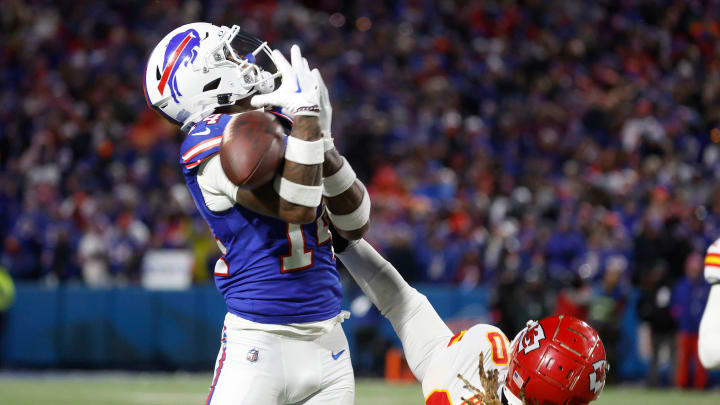Bills earn middling retrospective grade for offseason Stefon Diggs trade

Though it’s a bit early to discuss the most significant trades and free agent signings of the 2024 NFL offseason in retrospect—we don’t yet know how the maneuvers are actually going to pan out—that hasn’t stopped Bleacher Report from re-grading the spring’s biggest moves with a smidge of additional context. Writer Alex Ballentine recently re-graded the most headline-grabbing moves of the offseason, offering a new take on the Buffalo Bills’ decision to trade perennial Pro Bowl wideout Stefon Diggs to the Houston Texans.
Buffalo traded its alpha wideout to the Texans in early April, receiving a second-round pick in the 2025 NFL Draft in exchange for the now 30-year-old target. The move was done as part of the club’s concerted effort to get younger—and more financially manageable—at wide receiver; Diggs and Gabriel Davis departed in the spring, with their production figured to be replaced by rookie Keon Coleman, third-year player Khalil Shakir, and free agent signing Curtis Samuel.
Ballentine gave the Bills a retrospective “C+” trade for their decision to move Diggs, his primary hangup being the moves the team made to supplement his departure.
Related: Where does Bills' Josh Allen rank in NFL-executive polled QB ranking?
“Diggs had four more years left on his contract and the Bills were facing a tight cap situation, so it made sense for them to shake things up after they fell short of the Super Bowl yet again,” Ballentine wrote. “However, the Bills also lost Gabe Davis in free agency, which left their receiving corps depleted.
“The Bills' free-agent signings aren't likely to put fans at ease. Curtis Samuel, Marquez Valdes-Scantling and Mack Hollins don't exactly strike fear into secondaries. The BIlls will be heavily relying on rookie Keon Coleman to make an instant impact this season.”
The Texans, conversely, received a “B+” grade for their acquisition, with Ballentine noting that Houston is “taking a risk” by introducing the target-demanding Diggs into an offense that also includes Nico Collins and Tank Dell.
Though Buffalo’s C+ grade isn’t necessarily poor, it’s perhaps a bit early to “re-grade” the team’s trade, as there’s still a litany of undecided factors that will ultimately determine whether or not the Bills maximized the potential value. The primary motivation to trade Diggs was to create long-term salary cap flexibility; though Buffalo ate an immediate $31 million dead cap hit in trading Diggs, he was set to earn roughly $25 million over the next three seasons. Bills fans won’t see the true benefit of the Diggs trade until the team is able to use its freed-up cap space, which cannot happen until next season, at the earliest.
Related: NFL analyst circles underrated Bills DE as potential 'breakout' candidate
We’re also not yet sure what Buffalo will do with the premium draft choice it received in exchange for the Pro Bowler. Will it use it to select a potential difference maker in next year’s draft? Will it trade the pick for an immediate roster contributor? Will it package the selection in a trade-up to land a premier prospect? These are all possible scenarios, and we won’t ultimately know what the Bills do with the pick until next year, again making this “re-grade” a bit premature.
It also may be a bit early to write Buffalo’s revamped receiving corps off entirely. Shakir showed promise down the stretch of his sophomore season, and Samuel is re-uniting with the offensive coordinator who previously led him to his best production as a professional. Coleman is a talented ball-of-clay who will have every opportunity to succeed early, and given the fact that the team will now be able to take an egalitarian approach to aerial production as opposed to funneling the passing game through one weapon, the unit could quietly construct a productive season.
It’s ultimately too early to re-grade Buffalo’s decision to trade Diggs, as the trade was objectively made with the future in mind; re-grading it three months after it occurred leaves us without the necessary context that will ultimately determine whether or not the trade was beneficial for the team. Regardless, a C+ grade isn’t too bad; it’s just difficult to believe that it will be the grade still attributed to the trade when all is said and done.
— Enjoy free coverage of the Bills from Buffalo Bills on SI —
